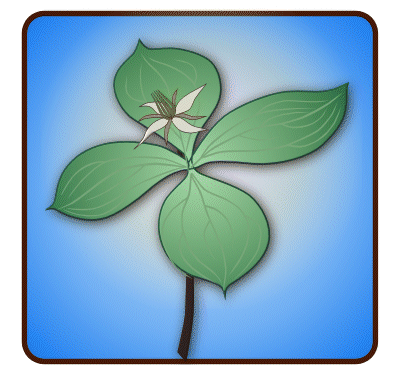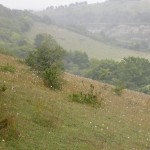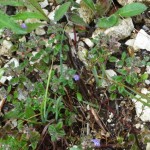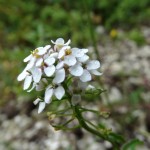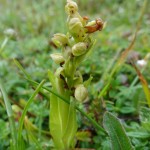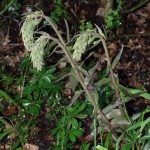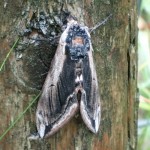Following months of drought, the walk led by Ian Esland at the northern section of Aston Rowant National Nature Reserve on Sunday 26th July took place in continuous rain with a strong wind from the south. It had been advertised as a butterfly walk but had to be reclassified as a botanical field trip. Ian explained that a few days before, in more suitable weather conditions, he had seen 18 species of butterfly, including an early Silver-spotted Skipper. The walk started out along the upper slopes of Beacon Hill, where there was a superb display of chalk grassland flowers, including Small Scabious, Clustered Bellflower, Common Rock-rose, Harebell, Dwarf and Carline Thistles, Pyramidal Orchid, Marjoram and Yellow-wort. The only butterfly of the afternoon, a single Meadow Brown, was spotted here. Wild Candytuft and Basil Thyme were found on bare soil patches at the top of the slope. Growing amongst the short turf at the top of the next field were good numbers of Frog Orchids. Initially these were hard to find, but once a few had been spotted, a surprising number of further specimens turned up.
The walk continued into the shelter of Little London Wood. Woodruff, Enchanter’s Nightshade and Wood Barley were amongst the sightings here. On bare ground next to the path were about 10 spikes of Violet Helleborine, just about to come into flower. The group then retraced their steps. A Privet Hawkmoth was a surprise find on a fence post just outside the wood. The walk continued back along the lower slopes of Beacon Hill. A female Bullfinch flew across the path and Juniper bushes could be seen higher up the slope. Greater Knapweed and Common Restharrow were added to the species list and there were a number of spikes of Fragrant-orchids, now gone to seed. The route dipped down into one of the sunken trackways which cross the reserve, before climbing back up a steep set of steps. At the side of the path, several Buckthorn bushes had heavy crops of still green berries.
Pictures by Laurie Haseler
| 26.07.15 RDNHS trip to Aston Rowant; car park SU732966 | |
| Leader: Ian Esland; 11 people attending. Rain and high winds | |
| Scientific name | British name |
| Plant species growing in the fields: | |
| Achillea millefolium | Yarrow |
| Agrimonia eupatoria | Agrimony |
| Anacamptis pyramidalis | Pyramidal Orchid |
| Arrhenatherum elatius | False Oat-grass |
| Artemisia vulgaris | Mugwort |
| Asperula cynanchica | Squinancywort |
| Blackstonia perfoliata | Yellow-wort |
| Brachypodium sylvaticum | False Brome |
| Briza media | Quaking-grass |
| Bromopsis ramosa | Hairy-brome |
| Bromus commutatus | Meadow Brome |
| Bromus hordeaceus | Soft-brome |
| Campanula glomerata | Clustered Bellflower |
| Carduus crispus | Welted Thistle |
| Carduus nutans | Musk Thistle |
| Carlina vulgaris | Carline Thistle |
| Cirsium acaule | Dwarf Thistle |
| Cirsium vulgare | Spear Thistle |
| Clinopodium acinos | Basil Thyme |
| Clinopodium vulgare | Wild Basil |
| Coeloglossum viride | Frog Orchid |
| Dactylis glomerata | Cock’s-foot |
| Daucus carota | Wild Carrot |
| Elymus caninus | Bearded Couch |
| Euphrasia spec. | Eyebright |
| Festuca gigantea | Giant Fescue |
| Festuca ovina | Sheep’s-fescue |
| Festuca rubra | Red Fescue |
| Filipendula vulgaris | Dropwort (in fruit) |
| Galium verum | Lady’s Bedstraw |
| Gymnadenia conopsea | Fragrant Orchid (in fruit) |
| Helianthemum nummularium | Common Rock-rose |
| Hypericum hirsutum | Hairy St John’s-wort |
| Hypericum perforatum | Perforate St John’s-wort |
| Iberis amara | Wild Candytuft |
| Inula conyza | Ploughman’s-spikenard |
| Juniperus communis | Juniper |
| Ligustrum vulgare | Wild Privet |
| Linum catharticum | Fairy Flax (in fruit) |
| Lotus corniculatus | Common Bird’s-foot-trefoil |
| Ononis repens | Common Restharrow |
| Origanum vulgare | Marjoram |
| Picris hieracioides | Hawkweed Oxtongue |
| Pimpinella saxifraga | Burnet-saxifrage |
| Poterium sanguisorba | Salad Burnet |
| Primula veris | Cowslip (in fruit) |
| Prunella vulgaris | Selfheal |
| Reseda lutea | Wild Mignonette |
| Rhamnus catharticus | Buckthorn |
| Rosa canina | Dog-rose |
| Rosa rubiginosa | Sweet-briar |
| Rubus fruticosus agg. | Bramble |
| Rubus idaeus | Raspberry |
| Scabiosa columbaria | Small Scabious |
| Senecio jacobaea | Common Ragwort |
| Solanum dulcamara | Bittersweet |
| Sorbus aria | Common Whitebeam |
| Thymus polytrichus | Wild Thyme |
| Torilis japonica | Upright Hedge-parsley |
| Viburnum lantana | Wayfaring-tree |
| Viola hirta | Hairy Violet (leaves) |
| Plant species growing in the woods: | |
| Chamerion angustifolium | Rosebay Willowherb |
| Circaea lutetiana | Enchanter’s-nightshade |
| Dryopteris dilatata | Broad Buckler-fern |
| Dryopteris affinis | Scaly Male-fern |
| Dryopteris filix-mas | Male-fern |
| Epipactis purpurata | Violet Helleborine |
| Galium odoratum | Woodruff |
| Geranium robertianum | Herb-Robert |
| Geum urbanum | Wood Avens |
| Hedera helix | Ivy |
| Hordelymus europaeus | Wood Barley |
| Lamiastrum galeobdolon | Yellow Archangel |
| Lapsana communis | Nipplewort |
| Mercurialis perennis | Dog’s Mercury |
| Milium effusum | Wood Millet |
| Mycelis muralis | Wall Lettuce |
| Poa nemoralis | Wood Meadow-grass |
| Plantago major | Greater Plantain |
| Polystichum setiferum | Soft Shield-fern |
| Rumex sanguineus | Wood Dock |
| Sanicula europaea | Sanicle (leaves) |
| Valeriana officinalis | Common Valerian |
| Veronica montana | Wood Speedwell |
| Viola riviniana | Common Dog-violet (in fruit) |
| Insects | |
| Sphinx ligustri | Privet Hawk-moth |
List by Renée Grayer
